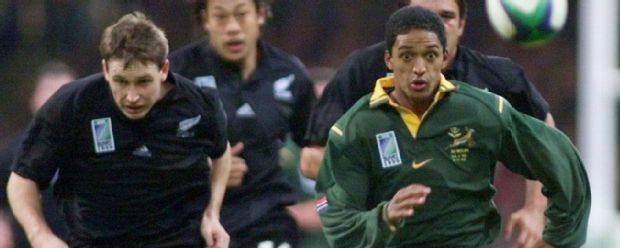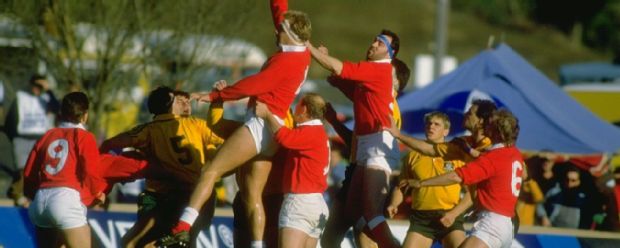|
Rugby World Cup
Bronze final offers 'no consolation' to most teams who take part
Huw Richards
October 28, 2015
Do you have any pre-match superstitions?
Some fans really do make the extra effort to watch rugby. I have a journalist colleague in Hong Kong who regularly stays up into the small hours to watch international matches -- and will be doing so again this weekend, with the final beginning at midnight there on Saturday. But even he has his limits. "The bronze final at 4 a.m. looks a bit of a stretch," he told me. But I suspect that's not just a matter of antisocial hours. The third-place playoff, as it used to be, was put firmly in its place by Springbok coach Heyneke Meyer during an otherwise remarkably upbeat and gracious press conference after last weekend's semifinal defeat by New Zealand: "It'll be mentally tough. It means nothing to me, it's like kissing your sister." That's Friday's match at the Olympic Stadium, a clash of the deflated and disappointed, a consolation prize of absolutely no consolation to most teams who take part. It is a competitive dead end, a flat negation of the knock-out principle. Nobody is eliminated, nobody progresses. Nor does rebranding it as the 'bronze' final help. The 1995 tournament offered a far more meaningful prize to the third place winner, which was exemption from qualifying for the next World Cup. And it is not as if France vs. England usually needs any sort of extra edge. But its most memorable moment came off the field. Early in the second half when the ITV news feed announced that then Prime Minister John Major had resigned the leadership of the Conservative Party. "Bloody hell", said the British writer sitting next to me. "I know England are playing badly, but that's a bit of an overreaction." There is doubtless one person who remembers this match fondly -- veteran Toulouse back-rower Albert Cigagna, a five-times champion of France with his club, who won his one and only cap at the belated age of 34. And he did end up on the winning side. But for the rest... The central truth of what Meyer said -- which is that it is a huge ask for players who less than a week ago were dreaming of being world champions to turn out, at the end of a hugely physically demanding tournament, for an anticlimactic clash of also-rans -- was even more apparent in Cardiff in 1999.  © OLIVIER MORIN/AFP/Getty Images This was yet another storied rivalry, New Zealand against South Africa. But both teams had been traumatised in epic semifinals a week earlier. The Boks had conceded their first ever Rugby World Cup loss to Stephen Larkham's skiddy extra-time drop goal, while the Blacks were ambushed by France in a match which must have seemed to an early hours TV audience back home like some hideous cosmic joke. Each team had seen dreams crushed, expectations destroyed and their understanding of their place in the world undermined. The Boks won because they were a little more sentient, but neither team looked bothered, even though -- like the contestants four years earlier -- they were playing perhaps their most cherished rival. That indeed may have made it worse -- the contrast with the fervent atmosphere in which those rivalries are usually played out achingly apparent. So why do they bother? The gate money and the TV revenue from a match played in a sold-out Olympic Stadium are much of the answer. And it also means that, after several weeks in which the global appetite for rugby should have been thoroughly whetted, there is more than 80 minutes of action on offer in the final week. But what it really needs is teams who, if not exactly happy to be there -- nobody wants to lose a semifinal -- do see some purpose to their presence and see it as an opportunity rather than an imposition. That was the case in the first ever World Cup, in 1987, when Wales played Australia in Rotorua. Wales had done better than was generally expected to reach the last four, and wanted to exorcise the memory of the 49-6 hammering inflicted by the All Blacks at that stage. Robert Jones, Wales's best player at the tournament, has recalled that the team initially, like most beaten semifinalists, simply wanted to go home and couldn't see why they had to play the extra match, but gradually began to see it as 'an opportunity to redeem ourselves and show that we could play.' The Rotorua public were happy to rekindle the traditional relationship between Wales and New Zealand, particularly since this carried with it the opportunity to stick it to the Aussies -- always a popular kiwi pastime -- and in particular their brilliant and bombastic coach Alan Jones, who had made himself spectacularly unpopular. The outcome was a vibrant atmosphere and a gripping contest won by Paul Thorburn's late touchline conversion of Adrian Hadley's try.  © Russell Cheyne/Allsport At least that's how this Welshman remembers it, and we'd have been even more impressed if we'd realise how infrequently Wales would beat Australia over the next 28 years. The 2011 third-placer, between the same countries, looked to be the more usual clash of the traumatised and depressed. But the greatest exception to this rule was in 2007, when Argentina played France at the Parc des Princes. Of course Argentina would rather have made the final, but their appearance in the semi represented a huge breakthrough, far in excess of expectation. The Pumas still had enthusiasm and an appetite. They wanted to show that their opening night ambush of the French was no fluke, but an accurate representation of their standing in the rugby world. And they achieved it in style, in the process scoring a length of the field try which, from a still largely forward-oriented team, was a foretaste of the creative brilliance they have shown in 2015. It was joyful, brilliant and purposeful -- everything this fixture usually is not. We can but hope that the class of 2015 bring the same spirit to this week's final. Their capacity for brilliance is greater than it was in 2007, but so too will be their disappointment at not getting to the final. And while we already know how the Boks feel, it is entirely likely that they'll still pitch up with their capacity as the game's most efficient wet blanket intact. It could feel like a long night... © ESPN Sports Media Ltd.
|
Live Sports
Communication error please reload the page.
-
Football
-
Cricket
-
Rugby
-
- Days
- Hrs
- Mins
- Secs
F1 - Abu Dhabi GP
Abu Dhabi Grand Prix December 11-131. Max Verstappen ()
2. Valtteri Bottas (Mercedes)
3. Lewis Hamilton (Mercedes)
4. Alexander Albon ()
5. Lando Norris ()
6. Carlos Sainz Jr ()
-
ESPNOtherLive >>
Snooker - China Open
Tennis - Miami Open

